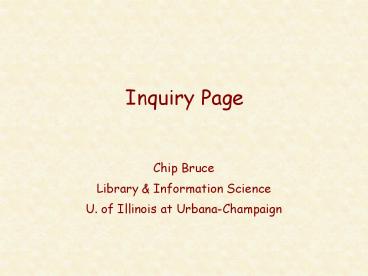Inquiry Page - PowerPoint PPT Presentation
1 / 27
Title:
Inquiry Page
Description:
Why do my eyes water when I stare. How does your body make tears ... 'Why do earthworms come out of. the ground after it rains?' 21st-century challenge. Find problems ... – PowerPoint PPT presentation
Number of Views:65
Avg rating:3.0/5.0
Title: Inquiry Page
1
Inquiry Page
- Chip Bruce
- Library Information Science
- U. of Illinois at Urbana-Champaign
2
Outline
- Inquiry-based learning
- Inquiry Page
- Community Inquiry Labs
- Research on inquiry
3
(No Transcript)
4
(No Transcript)
5
(No Transcript)
6
Harold Kroto
7
Stephen's questions
- Why do cars speed up passing a stop sign?
- Why do things far away seem blue
- Why do my eyes water when I stare
- How does your body make tears
- Is salt in our tears the same as the salt we put
on food - What's that pipe from the silo to the barn?
8
Weather curriculum
- Jack Easley asks students to look up at a
rainbow, but the children look down and ask - "Why do earthworms come out of
- the ground after it rains?"
9
21st-century challenge
- Find problems
- Integrate knowledge from multiple sources and
media - Think critically
- Collaborate
- Learn how to learn
10
Inquiry-based learning
- in which people construct knowledge based on
the questions that arise in their lived experience
11
Teacher as inquirer
- Inquiry about the world
- Partner in inquiry
- Modeling
- Guiding
- Inquiry about teaching and learning
12
Interests of the learner
- Investigate learn about the world through
authentic engagement - Create change the world
- Communicate enter the social world
- Express reflect on experience
- Dewey, The School Society, 1900
13
1) Inquiry Page
- Partner projects
- Resources for inquiry teaching learning
- Lesson planning support and idea site
- Tools for student and community inquiry
- Inquiry in Action
14
(No Transcript)
15
Learning
- Students
- Teachers
- Community members
- Developers
- practicums, internships, independent study
- weekly meetings
- workshops
- sequence of courses gt graduate specialization
16
2) Community Inquiry Labs
- Community support for collaborative activity
and for creating knowledge connected to people's
values, history, and lived experience - Inquiry support for open-ended, democratic,
participatory engagement - Laboratory a space and resources to bring
theory and action together in an experimental
and critical manner
17
2) Communities NCSA
- Inquiry involves people as active learners.
Students in inquiry classrooms may experience
anything from hatching chickens, to a classroom
business, to the bioinformatics of whales. Also
Bugscope, EdGrid, VR-Savvy, GK-12, RiverWeb,
ChemViz, EADS, ..
18
Communities Beyond
- Ethnography of the University
- Sisternet
- Telenature Life on the Prairie
- Freshman composition
- Service learning
- Marshall Islands
- CAMPWS (Water)
19
3) Research on inquiry
- How can we
- connect learning life?
- support participatory design?
- accommodate diversity shared values?
20
a) Connect learning and life
21
b) Participatory design
22
C) Accommodate difference shared values
23
Conclusion
- Design appropriate technology
- Generativity participatory design
- Sustainability incorporation into community needs
24
Learning to teach - 1
- As a guide for the experimentation we so freely
encourage, the table opposite will be helpful. We
must caution, however, that it is rife with
half-truths--despite our best efforts at
disclosure. We are dealing here with living
things whose colors, habits, and general
constitutions will vary with locale and with the
skill of the individual gardener.
25
Learning to teach - 2
- This unpredictability, which strikes terror into
the heart of the beginner, is in fact one of the
glories of gardening. Things change, certainly
from year to year and sometimes from morning to
evening. There are mysteries, surprises, and
always, lessons to be learned. After almost 40
years hard at it, we are only beginning. - Amos Pettingill, The Garden Book, 1986
26
Inquiry in science learning
- National Science Foundation research-validated
models (e.g., extended inquiry, problem-solving) - Reinventing Undergraduate Education (Carnegie
Foundation's Boyer Commission) 1 Make
research-based learning the standard - Project 2061 (American Association for the
Advancement of Science) 1 science literacy
for all high-school graduates
27
Contact
- Chip Bruce chip_at_uiuc.edu
- Inquiry Page inquiry.uiuc.edu





![❤[PDF]⚡ Who Are You, Really?: A Philosopher's Inquiry into the Nature and Origin of PowerPoint PPT Presentation](https://s3.amazonaws.com/images.powershow.com/10042698.th0.jpg?_=20240530026)

























